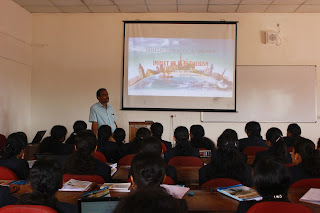Sunday, 23 July 2017
Wednesday, 5 July 2017
IMPACT OF IT IN TOURISM
 People
always have and always will continue to travel around the world to experience
new things. And advances in technology are there to influence and inspire this.
As a part of Domain
Expertise workshop we conducted a seminar on the topic impact of IT in tourism. The session was handled by Mr. Jacob Bose
(Faculty of M.M.H Department) on 5th July 2017. During
the session, the faculty explained about the history of tourism and how tourism
grows through information Technology.
People
always have and always will continue to travel around the world to experience
new things. And advances in technology are there to influence and inspire this.
As a part of Domain
Expertise workshop we conducted a seminar on the topic impact of IT in tourism. The session was handled by Mr. Jacob Bose
(Faculty of M.M.H Department) on 5th July 2017. During
the session, the faculty explained about the history of tourism and how tourism
grows through information Technology.
In
summary, developments in technology have led to big changes in the way that
customers use it to enhance their full travel experience. Websites, booking
platforms, apps and using social media all provide the opportunity to engage
and connect with customers on a variety of levels to allow an enhanced travel
experience. Now that this information for customers is easily accessible
(through various mediums), it inevitably means that it’s important for
companies to get smarter and adapt to remain competitive. Consequently, travel
companies must adapt to continue providing their customers with the best
customer experience possible. They must make sure they are utilizing the latest
technologies available to give customers what they need.
THE BIG IMPACT FROM BIG DATA….
Big data is term that describe the
large volume of data, both structured and unstructured. The term big data is
relative new. The big data is a broad term for data sets so large or complex
that traditional data processing applications are inadequate. Big Data is a
technologies and initiatives that involve data that is too diverse,
fast-changing or massive for conventional technologies, skills and infra-
structure to address efficiently. Said differently, the volume, velocity or
variety of data is too great.
But today, new technologies make it
possible to realize value from Big Data. For example, retailers can track user
web clicks to identify behavioral trends that improve campaigns, pricing and
stockages. Utilities can capture household energy usage levels to predict
outages and to incent more efficient energy consumption. The Governments and
even Google can detect and track the emergence of disease outbreaks via social
media signals. Oil and gas companies can take the output of sensors in their
drilling equipment to make more efficient and safer drilling decisions.
Subscribe to:
Comments (Atom)


